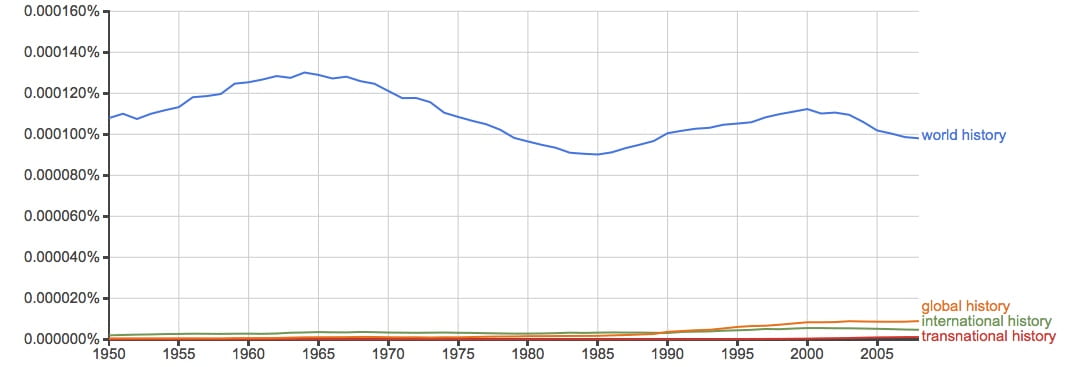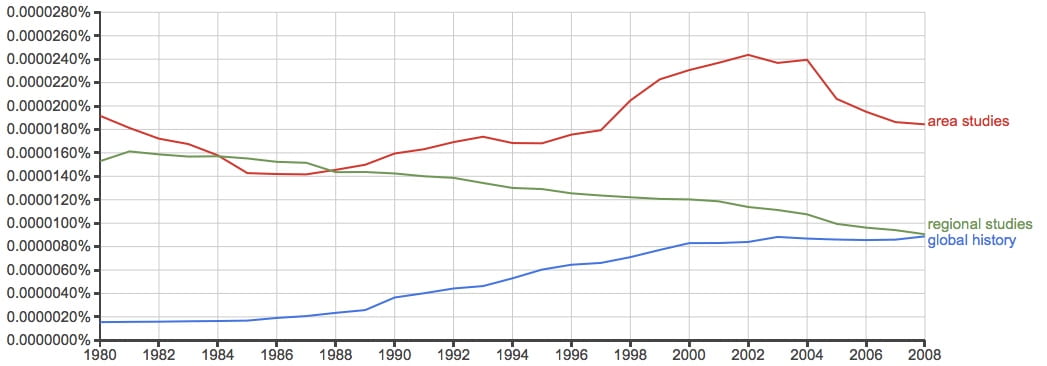by John Raimo
It is a truth universally acknowledged, that everyone feels strongly about global history. It may even prove more contentious so far as intellectual history goes. Yet what goes comparatively little discussed would be how today’s global history has redefined, institutionalized, and finally nationalized itself. This makes for a fascinating intellectual terrain as all three processes blur into one another, a line of criticism growing among global history’s critics (appropriately enough scattered across the world). Put another way, just how global is global history? The question admits more concrete reflections than perhaps its advocates or skeptics imagine.
Global history begins as a project of definitions. That is, the field defines ‘the global’ rather than the nation as its subject. What this might prove remains contestable, however. ‘Global’ more largely entails the phenomenon of transnational networks (perhaps the subject of inordinate focus), global as an actor’s or a native category—one which may be sharply contested as a colonial product—or a framework of historiographical comparison, as Samuel Moyn and Andrew Sartori have eloquently pointed out (in part echoing such anthropologists as Marcel Detienne). This is very much a revisionary project as the nation falls away as a primary unit of analysis.

Yet in the Anglophone context, ‘global’ history only achieved its currency against ‘world,’ ‘transnational,’ and ‘international’ history fairly recently. History has always been global, of course, from classical encounters of foreign civilizations through ecclesiastical, philosophical, universal, comparative, and finally ‘deep’ history. The historiographical background in this instance seems much more pointed, however. Historians such as Charles S. Maier, Michael Geyer, and Charles Bright defined their work as ‘global’ in the 1970s and 1980s. Later decades saw a great moment of ‘regional studies’ as such works as Larry Wolff’s Inventing Eastern Europe and Tony Judt’s Postwar among others appeared.

A relationship exists between ‘regional studies,’ ‘area studies,’ and global history. This is partially a Cold War story and partly an institutional story. Federal funding disappeared for certain departments and ‘critical languages’ became harder to study. Moreover, Cold War frames of reference later fell away, ‘national’ histories came under increasing scrutiny, and academic hiring in America and Britain eventually became tighter. (We can perhaps also guess that the complaint began to sound regarding ‘Balkanization’ of separately-funded research centers at wealthier institutions.) Thus a generation of scholars trained in ‘national’ histories began writing on a larger scale just as the institutional training they received and traditional career tracks began to disappear. Here we begin to return to the question of what global history entails in point of concrete practice today.
‘Global’ slowly came to replace global. How we define it today cuts to the heart of several problems. What is the actual, concrete subject of global history as opposed to, say, transnational history or the study of transferts culturels? What methodologically distinguishes an imperial history of New Zealand, Egypt, and Ireland from a study of the Hapsburg monarchy or a Mexican-American study, for instance? More pointedly, why might we feel that farther-flung connections somehow prove inherently more interesting than relations between contiguous states, even ones with vastly different languages, cultures, and histories? And finally, what sorts of subjects and training have become lost as many young scholars rush to write global history?
Criticism is converging around such questions. Cutting away the nation, region, and area leads to a theoretically finite range of properly ‘global’ topics: supranational organizations, NGOs, empires, commercial and economic networks, technology, and the environment. In terms of intellectual history, the movement of ideas (political and otherwise), educational models, religious vocabulary, and cosmopolitan culture often enough prove indisputably global in nature. It need not be said that no single one of these subjects has been exhausted, yet not every NGO was created equally interesting. As Philippe Minard among others has pointed out on in this register, global history easily enough tips into superficial histories of globalization as such.
Similarly, a great deal can be lost wherever the ‘global’ overrides ‘national’ expertise, local knowledge, and the significant linguistic competencies necessary for any historical depth. Certain places figuratively fall off the map if they cannot be seen as ‘global’ at any given moment. The same goes for languages. Religious and philosophical texts go unread insofar as they remain untranslated, for instance, lacking an imperial power buttressed behind them. Historians such as Sebastian Conrad and Andreas Eckert have warned how global history can also devolve into a fetish for simple distance, the simple multiplication of national case studies (barely disguised under the rubric of the ‘state’), highly-restricted periodizations, and finally inadvertent reprises of colonial lines of historical thinking.
Negotiating these criticisms also entails institutional and national self-reflection, not least in the training afforded to graduate students. The fostering of a deeper sort of global history would include fluency in different languages (if not some philological training as well), a familiarity with non-Anglophone scholarship as well as with primary materials, a great deal of time and funds devoted to research in scattered archives, reformed examination structures, revised job descriptions, different grant guidelines and new fellowships, and finally the broadening of academic networks and exchanges between countries. In a word, global history cannot be wholly Anglophone.
All this is clearly impossible on the collective and institutional level, especially in light of the sheer resources demanded—something global history’s advocates often conveniently forget. So far as ambition, personal research, and historiography go, however, the criticisms of global history might still prove invaluable. And here global history’s critics often overlook the relative youth of its most current iterations. The picture is not quite so bleak. The field remains in flux, and many wonderful scholars have begun pushing it out further—both literally and figuratively. The Toynbee Foundation’s blog features interviews with many of global history’s most exciting and promising historians. Moving from America and Britain outward also carries the possibility of changing dominant nationalist paradigms of history elsewhere. It may be neither too early nor too late to imagine a global history of the discipline itself one day.
jhiblog
Leave a Reply Cancel reply
RECENT POSTS
- Marx’s Reception in the United States: An Interview with Andrew Hartman
- Spaces of Anticolonialism: Disha Karnad Jani Interviews Stephen Legg
- Announcing the Martin Jay Article Prize for Graduate Students
- The Architects of Dignity: Disha Karnad Jani Interviews Kevin Pham
- “Language and Image Minus Cognition”: An Interview with Leif Weatherby
Subscribe to receive an email notification for each new post
Completely spam free, opt out any time.
Please, insert a valid email.
Thank you, your email will be added to the mailing list once you click on the link in the confirmation email.
Spam protection has stopped this request. Please contact site owner for help.
This form is protected by reCAPTCHA and the Google Privacy Policy and Terms of Service apply.



3 Pingbacks